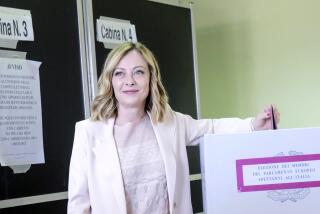ITALY : Post-Cold War Political Races Full of Surprises
- Share via
ROME — Italy is heading for national elections with an unsettling case of Cold War withdrawal. A convoluted national political game long opaque to outsiders is suddenly perplexing insiders as well.
Campaigning officially began this week for an April 5-6 vote to renew a bicameral Parliament elected in 1987--and, effectively, to replace Prime Minister Giulio Andreotti. Emerging from the complexities of backroom bargaining are suggestions that Socialist Bettino Craxi will emerge as Andreotti’s successor to lead Italy’s 51st government since World War II.
That may happen, but there could be surprises along the way: The cornerstones of postwar political debate are gone. Fascism died early as a threat to Italian democracy. Now communism, too, is dead, depriving Andreotti’s dominant Christian Democrats of their strongest political opponents and of a standby Red Menace to provide glue for their own cohesion.
As a result, there are many wild cards in today’s game, with the electorate apparently more receptive to change than is the political Establishment.
Never before have so many young parties taken so many protest platforms to the nation’s voters. In a system of strictly proportional representation, never before has there been a prospect of such parliamentary fragmentation.
“The political system is in crisis. It can and must be renewed . . . in a rational, ordered way,” Craxi told Italian reporters, warning that a growing multitude of parties could lead Italy toward governmental paralysis.
More than two dozen parties are inscribed for the election of 630 deputies and 315 senators. There is scarcely a special-interest group without its own party: environmentalists, housewives, pensioners, hunters, automobile owners, tenants and small regional ethnic groups from Sicily to South Tyrol. There is the Anybody Party, and the Party of Love, whose candidates include porno stars.
An Olympic marathon runner is among the Socialist Party candidates, the Republicans have a boxer, former Communists a prominent actor, and neo-fascists the 29-year-old granddaughter of former dictator Benito Mussolini. One newspaper, summarizing Alessandra Mussolini’s career, calls her “almost a doctor, almost an actress and almost a deputy.” Mussolini says she is moved by the spirit of her grandfather, but it may be a resemblance to her aunt, Sophia Loren, that attracts the most rapt attention.
Neo-fascists traditionally run fourth in splintered Italian elections with around 6% of the vote, but this time they will likely be overtaken by the lion of Italy’s new parties, the virulently anti-Establishment Lega Nord.
Lega’s founder, Sen. Umberto Bossi, who looks like a schoolteacher and sounds like a demagogue, has “Buchananed” his way to national prominence by exploiting the disquiet of the rich Italian north. He rails against a centralized political system run principally by southerners who unabashedly favor their pals and their region, Italy’s most economically backward.
Corruption, patronage and endless pork-barreling for the south underline opposition criticism of the Christian Democrats, who regularly attract around 35% of the vote.
Catholics supported by the Vatican, the Christian Democrats have grown fat portraying themselves as Italy’s bulwark against communism. But now they have lost their villain.
The opposition Italian Communist Party, once the largest in the West and Italy’s second-largest political movement, did not long survive the Berlin Wall. It changed its name to the Democratic Party of the Left and proclaimed itself social democratic, in the process shedding a hard-line 15%--which created the Refounded Communist Party.
More to Read
Sign up for Essential California
The most important California stories and recommendations in your inbox every morning.
You may occasionally receive promotional content from the Los Angeles Times.












